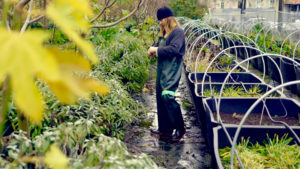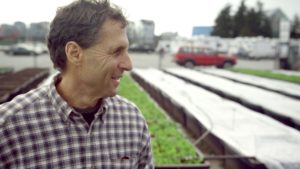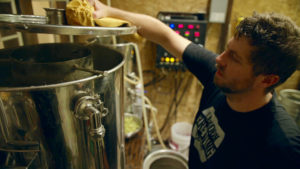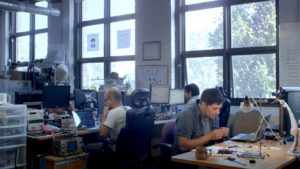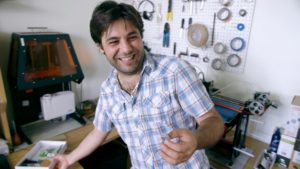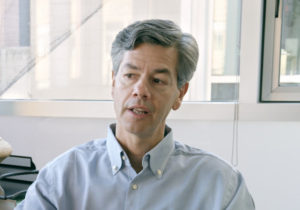Reviewed by Bill Locke
85 minutes running time
Director Trevor Meier; Producer Melanie Wood
An urban farm. An open source technology developer. A micro brewery. A free software tool. A mixed-use co-living space. A weekly South Asian style market. What do they all have in common? They are all part of the aptly named New Economy.
The farmers, technology developers, brewers, community activists and housing organizers that we meet in this new documentary are focused on the same question: “How can a successful business model include people working together for the common good?”
They are all entrepreneurs, but they are also instigators, provoking a disruption in the way we typically think about running a business. A New Economy explores their experiments in making money in viable, sustainable ways, without compromising ideas they hold dear – such as rewarding human effort equitably, embracing collaboration instead of competition, and adopting a democratic decision-making model within a company. They want to move beyond the obsession with profit making, creating new kinds of workplaces that exist in a more humane, inclusive, cooperative future. Their focus is on building community.
A New Economy shows us fascinating glimpses of this fast-growing new movement, that is sick and tired of the same old slavery to the bottom line. A number of experts weigh in with their observations in the film as well. Gar Alperovitz is a polictical economist and historian, the author of America Beyond Capitalism and co-founder of The Democracy Collaborative.
“We are laying the groundwork for a very moving period of history,” says Alperovitz, “where potentially very big things can happen.”
One of the problems that many of these companies are addressing is the lack of inclusion in our current economy. They want to involve people who are often left out of any kind of ownership. A number of very different business models are portrayed in the film, with a moving human touch in the stories of the people involved. One is an urban farm project in Vancouver called Sole Food Street Farm, which embraces street people by providing meaningful employment, agricultural training, and a warm welcome to join a community of farmers and food lovers. Their mission is to encourage the creation of other small farms in urban neighbourhoods, and work towards transforming the mental, physical and spiritual health of many forgotten people trapped in poverty, homelessness and drug addiction. Michael Ableman, the cofounder and director of Sole Food Street Farms, wants those who work there to experience a sense of ownership, and also to have a chance to give back to their own community.
As one of Sole Food’s workers explains, “A lot of people who live on the East side of Vancouver don’t believe they’re worth the puddle that they’re stepping in. I battled with addiction, but it didn’t matter to them here. It’s not very often that you get to care for and nurture something. Sole Food saved my life.”
The London Brewing Co-op is another great example of the New Economy that we see in the film. It’s a worker owned co-operative based in London, Ontario, which started as a project of a few friends, creating small-batch beers that utilize local, organic ingredients. Besides the brewery, they have now expanded to run The Root Cellar Café in London’s Old East Village, and On the Move Organics – both key actors in promoting local farmers and providing a warm-welcoming space for folks in the community to gather. The London Brewing Co-op is owned by those who work there, with all employees enjoying profit-sharing and an equal voice in the direction and day-to-day operations of the brewery. As the founders describe it, they are interested in the rights and well-being of everyone involved with the brewery, with a shared goal of “putting quality over quantity, and producing a truly local pint of beer – one that’s best served over conversation.”
It’s probably no coincidence that many of the stories are from Canada, or that the film is sponsored in part by the BC Credit Union. We seem to be caught up these days in the land of the North with social entrepreneurship, social impact, collaboration, and community-based enterprises. Millions of dollars flow from our provincial and federal capital every year in support of this enthusiasm for socially-minded, collaborative projects and companies. And as this film demonstrates, there are many models already that are working well.
Do they end up being sustainable? In some case, they are not only sustainable; they are highly profitable and embraced by a huge number of consumers. Loomio, the computer app company started in New Zealand, is now being used by more than 100,000 people in 93 countries and 31 languages. It is very effective at facilitating collaborative decision-making, which is central to many of these cooperative projects, and is as easy to use as email. It was birthed by a group of activists in New Zealand, who were inspired by the “bottom-up” model of the Occupy Wall Street movement in 2011.
Being a self-described geek, my favorite success story is Montreal-based Sensorica, the open source hardware developer. It’s a highly networked operation with over 100 members around the world. They develop cost-effective technologies that work as well or better than conventional products at a fraction of the cost. Tiberiusi Brastaviceanu, who has a background in physics, non-linear optics and laser applications, is one of the co-founders. He is one of the main architects of Sensorica’s open value network model, which allows people to join and create value together in an open environment.
As Brastaviceanu says in the film, with a happy grin on his face, “Everything is converging towards a more collaborative economy, for sure. And when you free people economically, they’re free. We’re taking over, guys!”
A cynic might say that our governments and our societies are being engulfed by ideologically driven, inefficient operations of all kinds, mindlessly wasting our money. They might think that these idealistic, mostly young people should invest their own dollars and stop looking to tax funding or grants from foundations to subsidize their efforts, and balance their books like every other businessperson.
I have to agree that anyone interested in doing something new has to invest of themselves and of their own dollars. Having worked on many socially minded projects (including Kolbe Times) and helped many of these leaders, I can say that these projects consume a lot of money and energy. What many viewers might not know about the people who lead these projects is that they invest as heavily as many businesspeople (if not more), working just as hard and usually without ever receiving the financial payback that successful businesspeople receive. The intriguing stories of the passionate, creative and dedicated people in A New Economy amply demonstrate that.
John Fullerton, another of the experts in the documentary, previously was a Managing Director of JP Morgan, in charge of multiple capital markets. He is now rethinking what capital and capitalism mean. Fullerton is the author of Regenerative Capitalism, and is also director of the Savory Institute, which promotes large-scale restoration of the world’s grasslands. In the film, Fullerton asks a great question – “What is real wealth?”
His answer: “It’s not money. It’s fresh air to breathe, family, community. That’s real wealth.”
Watch A New Economy on Netflix in Canada or the U.S.
Check out the website at www.aneweconomy.ca for more information, and to find out about screenings in your area.
All photos courtesy of A New Economy


